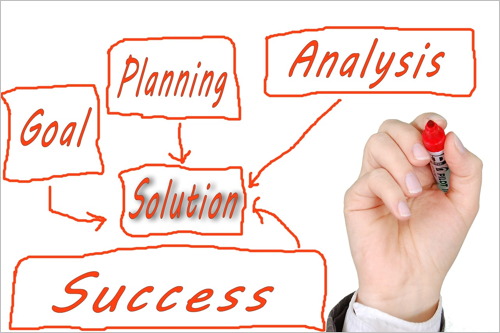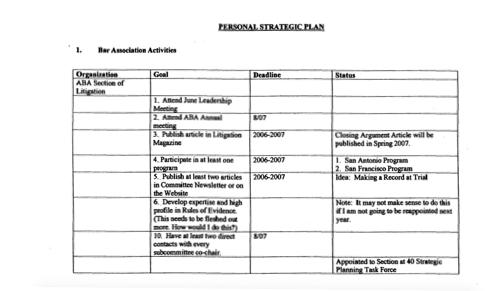This is the third of three blog posts on marketing strategies for lawyers; the first was Marketing for Lawyers, Part I: Setting the Stage and the second was Marketing for Lawyers, Part II: De-Mystifying Business Development Activities.
A marketing plan is really nothing more than promises you make to yourself. You are going to give yourself some assignments and deadlines, and it will be your job to follow through.

Why Bother to do a Marketing Plan?
The marketing plan is a roadmap. If you were about to set out on a journey, you would want to have a roadmap or GPS to guide you. Without it, you run the risk of wandering around aimlessly in the woods on your quest for business. The time you spend lost in the woods is time you are wasting. Since you are a really busy person and you do not want to spend an inordinate amount of your precious time on marketing, the roadmap is a time saver.
The marketing plan does even more for you:
- It helps you to eliminate excuses.
- It helps you to focus by setting up tasks that you can do based on the time you have available to devote to the task.
- It helps your firm to feel confident about the seriousness of your purpose.
- It’s empowering for you. You know just what needs to be done, which eliminates the sense of ambiguity or amorphousness that can otherwise deter motivation.
- It can keep you from being sidetracked by other requests for assistance or demands on your time because you will analyze the requests based on whether they further your goals.
When you map out a marketing plan, you should consider some or all of the following:
- Your abilities, interests, and strengths as a lawyer and as a person.
- What you will need to do in the four key realms of networking, leadership, meetings, and client contact.
- Whether you will need to obtain specific assistance from your firm, and if so, what.
- How you can engage your secretary or other staff to achieve your goals.
- Whether to meet with key people by yourself or with others from your firm.
A Sample Marketing Plan
Here is a sample marketing plan that was developed after in-depth discussions about business development goals; you can use it as a model. Click on the image to download the PDF.
 In developing the plan, we considered organizations, community activities, writing, publishing, speaking, key people at work, people known from past experiences, hobbies and more to identify potential areas for growth relationships that could lead to business. We talked about the mindset that works best when going to events or to one-on-one meetings. We addressed how to message effectively, and the need to persevere despite the difficulty of seeing immediate progress and much more.
In developing the plan, we considered organizations, community activities, writing, publishing, speaking, key people at work, people known from past experiences, hobbies and more to identify potential areas for growth relationships that could lead to business. We talked about the mindset that works best when going to events or to one-on-one meetings. We addressed how to message effectively, and the need to persevere despite the difficulty of seeing immediate progress and much more.
Instead of thinking of this as a marketing plan, think of it as “promises you are making to yourself.” Use the goal / action / deadline / status as a progress report, and think about any impediments to implementation, including emotional impediments such as nervousness about seeming to be needy, or anxiety about going to a group meeting. Removing emotional impediments is by far the most important component of a successful campaign to market services. This is something that is often not considered when people talk about marketing. What I have learned is that many marketing plans are pretty easy to put together and they look lovely and have great promise, but the biggest problem to getting the work done is emotional discomfort about implementation. Working through personal issues is essential. If you do not do that, even the best marketing plan will sit on your desk and never evolve into business.
What can you do to prepare?
Review Personal Issues
Identify how you best relate to people:
- Do you love parties?
- Do you prefer one-on-one meetings?
- Do you enjoy speaking to large groups?
- How about small groups?
- Do you teach in any capacity?
- What social skills do you want to build?
- Have you written for any journals or trade magazines?
- What constraints do you anticipate in setting up your marketing plan?
Future Business
Describe your ideas about where your cases could come from in the future.
If you can spend some time at least thinking through these questions, it will help to clarify your actions.
Conclusion
The path to greater business generation is almost like a quest on which you embark. Think of it as a medieval quest. In the beginning, it is not always perfectly clear which path to take, but if you know the castle or castles you are determined to reach, the path will get clearer as you go along. Your job is to get out there and find your way into and through the woods. You have to help people to trust you and like you. As your quest evolves, your job becomes more specific and clear and you will have sell meetings with potential clients, but they will be more like counseling or coaching because you already have the client’s trust.
In its most elemental form, marketing is a way to create trust relationships in the castle or castles where you derive business or want to derive business.
And one more key thing: what really works best is changing from thinking there is something you need to do, to thinking of the activity as enjoyable and fun. Finding the fun in interpersonal interaction is very important for long term motivation. How can this happen? By thinking about what you actually get a kick out of when you meet new people, instead of focusing on the dread. When I work with clients who are anxious about marketing and relationship building, we talk about how deeply rewarding it feels to develop a new friendship and tap into that instead of focusing on some imperative like “you have to do this or that to be successful” or “these are tasks you have to complete by such and such time.” When the focus is on enjoyment and personal reward, people are much more able to follow through.





